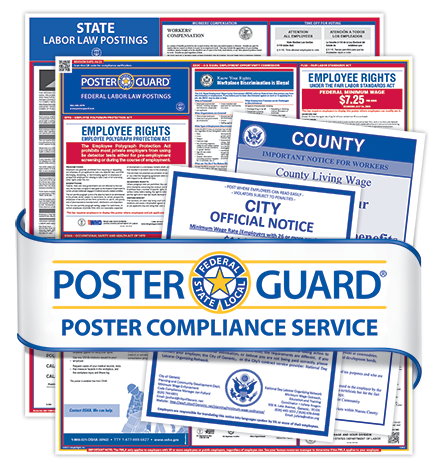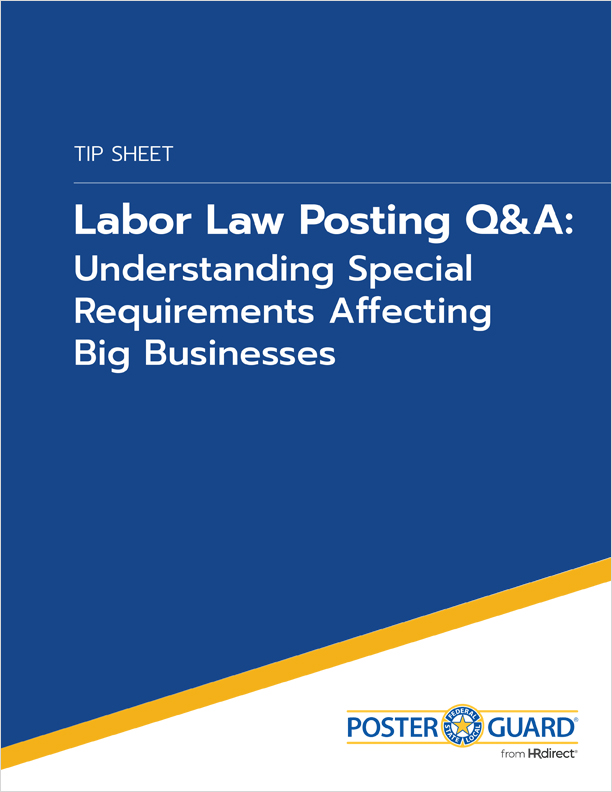When it comes to labor law posting compliance, businesses across the country must display mandatory federal, state and local labor law posters … or face the possibility of hefty fines.
But did you know that certain industries have additional required postings for employers? Public sector employers, federal contractors, healthcare establishments and restaurants are the four key industries that need to take note.
Plus, with President Trump’s newly appointed Labor Secretary Alex Acosta at the helm, chances are likely at the Department of Labor (DOL), which may affect the posting climate even further.
How Acosta will influence the policies and actions of the DOL remains to be seen. In the meantime, it’s essential for business owners to stay up to date on workplace posting requirements and keep a close watch on industry-specific postings.
Does your business fall into one of these specific industry categories? Let’s take a closer look at your added responsibilities.
Public-Sector Posters Pertain to Government Employers
The public sector is one of the largest and fastest-growing industries in the United States, comprised of organizations owned and operated by the government. This includes federal, state and local agencies that provide public services, such as the military, public transit, primary education and healthcare for the poor.
Public-sector employers must display special notices and a unique federal poster that includes FLSA and OSHA postings, in addition to federal, state and local postings. Each state also has its own public sector posting requirements, such as:
- E-Verify poster
- Right to Know poster
- Whistleblower rights poster
- Notices about electronic monitoring, privacy, and smoking
Depending on the business, these posters are commonly displayed at fire stations, police departments, public schools, courthouses, public-transit offices and other government agencies (including the enforcement agencies responsible for issuing these posters).
Updates occur intermittently, so it’s important to keep current. For example, the Maine OSHA poster was updated in April 2017 to include the federal OSHA rule requiring employers to inform employees of their right to report work-related injuries and illnesses free from retaliation. Ohio’s Public Sector Domestic Violence poster was updated in January 2016 to add contact information for a new agency responsible for reporting and assisting with domestic violence issues.
Federal Contractors Include a Variety of Businesses
The number of businesses considered federal contractors is growing, due to developments in the economy and new government funding initiatives that apply to more companies. Included are construction and defense contractors, finance and banking, telecommunications, technology, educational institutions, transportation, and even some nonprofit organizations.
Many of the additional posters required for federal contractors are a result of executive orders issued by the Trump administration. However, the specific posting obligations depend on what contract you hold, what government agency is involved and how much the contract is for. To date, there are approximately 14 required postings for federal contractors.
The topics federal contractor posters cover are varied. One example is the Pay Transparency Nondiscrimination Provision, first required in 2016. It prohibits federal contractors from terminating or discriminating against employees or applicants for inquiring about, discussing or disclosing their own compensation or the compensation of another employee or applicant.
Other posters that pertain to federal contractors are:
- Davis-Bacon Act poster
- Walsh-Healey Contracts Act/Service Contract Act poster
- Notice to Workers with Disabilities/Special Minimum Wage
Keep in mind, too, the Federal Contractor National Labor Relations Act Rule (NLRA) and the Paid Sick Rule and Minimum Wage Rule each have workplace poster requirements for companies with federal contracts. (Although some analysts believe Acosta could roll back these rules, based on his background with the NLRB.)
Another rule that could be on the chopping block is the Nondisplacement of Qualified Workers Under Service Contract Rule, which gives workers on a federal service contract the right of first refusal for employment with the successor contractor. Analysts believe Acosta will view this rule as unnecessary and an unfair infringement on business, making it subject to reversal.
Healthcare Postings Cover Worker Safety and Other Issues
Is your business a doctor’s office, a hospital, clinic or urgent care center? In many states, healthcare facilities must display certain employee-facing notices in addition to the basic federal, state and local posters. In fact, if you’re in healthcare, you could be responsible for up to 15 additional employee-facing posters, depending on your business and the state where you’re located.
Most industry-specific posters pertain to issues such as bio-hazardous materials, radiation and private health information (HIPAA). Examples include:
- Bloodborne Pathogens
- Health Effects from Contaminated Water in Eyewash Stations
- Safe Patient Handling Programs
Any of these can be updated for specific geographic areas at any time. For example, the New York Patients Bill of Rights was revised in February 2017 to include three additional patient rights. In Michigan, the Radiation Notice to Employees was updated in July 2016 to add new rules regarding the monitoring and reporting of employee radiation exposure.
In fact, depending on what state you are in and what type of facility you operate, there could be up to 15 additional notices you’re required to post.
Restaurant Posters Address Cleanliness, Wages, Tips
In today’s increasingly complex posting environment, most restaurants and food-service establishments must display more than the standard federal, state and local postings. Depending on your state, you may need to display special health-related, employee-facing notices regarding hand-washing, no smoking, choking, CPR, tips, and wages, and service of alcohol to minors.
Also, did you know that some handwashing posters are so specific they vary state to state on what exact procedure to use?
Restaurant labor law posting requirements change continually. For example, in December 2015, Connecticut adopted a new law prohibiting the use of e-cigarettes and related vaping products in certain industries, including restaurants. In December 2016, New York updated its minimum wage from $9 to $10.50 for small employers to $10 in Long Island and Westchester County and $9.70 for the remainder of New York State. Changes like these all require new posters to remain compliant.
Total, Year-Round Compliance Can Be Easy
Sound like a lot to manage? You don’t have to do it alone! Instead, turn to our dedicated posting service to stay current and protected. In a single year, it’s not unusual for the Poster Guard® Compliance Protection legal team to identify and track hundreds of federal, state, local and industry-specific posting changes (including minimum wage increases). Changes can be frequent and complex, requiring continual monitoring and expert interpretation.
With Poster Guard® Compliance Protection, you receive 365 days of hassle-free labor law posting compliance. Best of all, you’re guaranteed 100% compliance.



